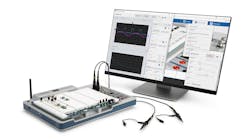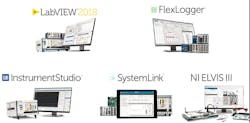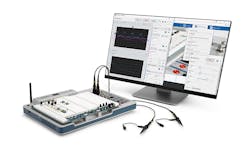National Instruments (NI) had plenty of new announcements at NI Week 2018. They included a new version of LabVIEW 2018, FlexLogger, InstrumentStudio, SystemLink, and NI Elvis III (Fig. 1). These all are built around or work with LabVIEW.
LabVIEW 2018 and LabVIEW NXG are NI’s latest LabVIEW integrated development environments (IDEs). LabVIEW 2018 remains the mainstay—it’s backwards-compatible with earlier versions of LabVIEW and mostly forward-compatible with LabVIEW NXG.
1. New announcements at NI Week 2018 include a new version of LabVIEW 2018, FlexLogger, InstrumentStudio, SystemLink and NI Elvis III.
The upgraded LabVIEW 2018 adds a number of new features, such as code support for Python. This allows for integration with third-party tools that support Python. LabVIEW NXG 3.0, in beta right now, includes Python support.
FlexLogger addresses a common LabVIEW use: data logging. FlexLogger is a configuration-based data-logging software platform for validation test. It helps test departments quickly capture accurate, well-documented data and verify system functionality without programming. Thus, it leads to significantly simplified test automation systems. FlexLogger can capture and integrate analog sensors, digital pulse frequencies, CAN signals, and calculated channels into the universal Technical Data Management Streaming (TDMS) file format.
InstrumentStudio is also designed to let developers use and manage NI hardware without resorting to programming. It’s designed to support many of NI’s hardware devices on the PXI platform and can be used to see what information is being captured or controlled. This interaction can be done while the same hardware is being utilized by LabVIEW applications. InstrumentStudio also is able to export a configuration like LabVIEW VIs, which can then be customized.
SystemLink looks at automated test and automated measurement from a systems-level, where systems are managed in order to, for instance, keep them up to date. It helps to improve operational efficiency and decrease maintenance costs using a centralized, web-based interface to automate tasks such as software deployment, remote device configuration, and system health performance monitoring. These are tasks that were often done manually or using custom processes. It’s designed to scale from small installations to enterprise systems that consist of NI and third-party test hardware and software.
2. NI Elvis III targets universities using LabVIEW.
NI Educational Laboratory Virtual Instrumentation Suite (ELVIS) III (Fig. 2) is a hardware platform that runs LabVIEW and targets universities and other educational entities. ELVIS III uses NI’s FPGA-based platform to support student-centric learning and LabVIEW prototyping. It can be used to teach fundamental concepts in areas such as electronics, mechatronics, controls, power electronics, and communications. It’s supported by a range of third-party vendors, including Digilent, Emona, Quanser, and Texas Instruments. With LabVIEW 2018, the suite is able to teach LabVIEW and Python.




